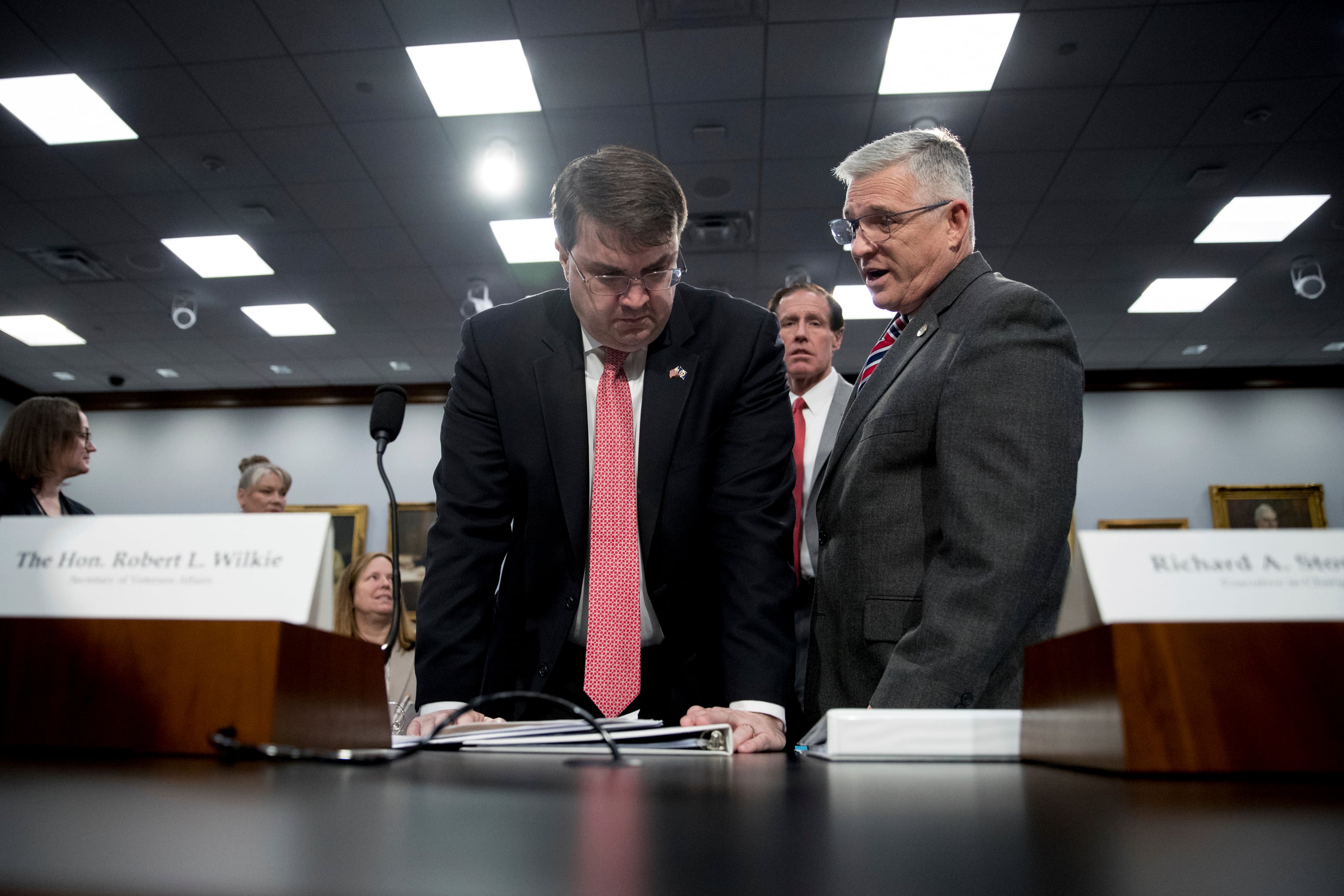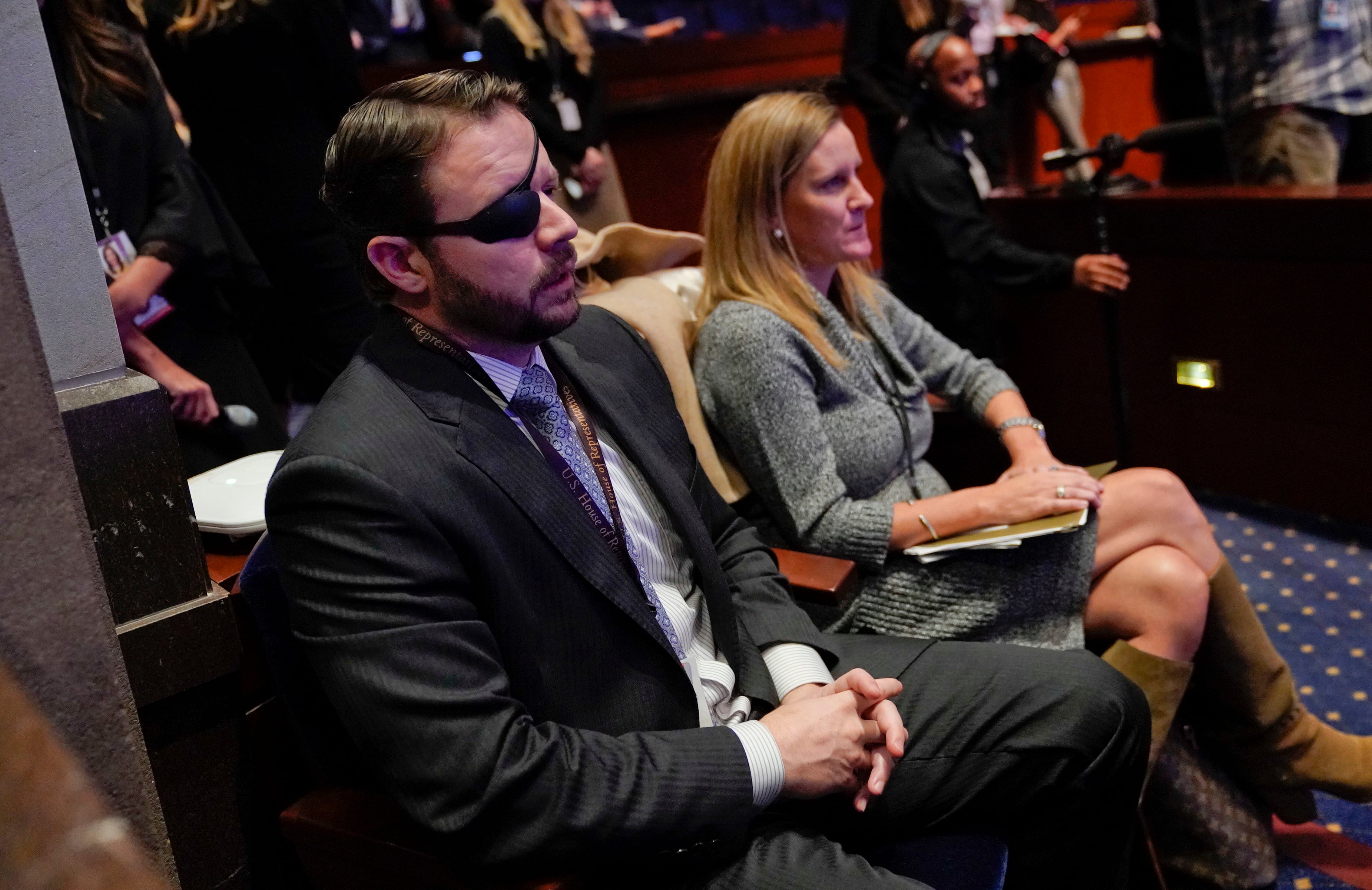A pair of prominent freshman lawmakers offered sharply different views about the future of the Department of Veterans Affairs health care this week, bringing the ongoing debate over fears of department privatization to the next generation of elected leaders.
The duo — Democratic New York Rep. Alexandria Ocasio-Cortez and Republican Texas Rep. Dan Crenshaw — have both built national followings since their elections last fall, and recently have sparred directly over social media concerning rhetoric surrounding Muslims and the Sept. 11 attacks.
But this week marked each legislator’s first focused entry into VA policy discussions, and their comments suggested both will make those issues a key focus in months to come — with very different positions on the issue.
RELATED

In her home district on Wednesday, Ocasio-Cortez took part in a rally organized by National Nurses United and other advocates who warned that current administration plans are taking the department on a path towards privatization by dramatically expanding community care eligibility for veterans.
“They’re trying to ‘fix’ the VA for pharmaceutical companies, they’re trying to ‘fix’ VA for insurance corporations, and ultimately they’re trying to ‘fix’ the VA for a for-profit health care industry that does not put people or veterans first,” she told an applauding crowd advocates who have lobbied against the changes for months.
“We have a responsibility to protect (VA). Because if there is any community that deserves Cadillac, first-class health care in the United States of America, it is our military servicemembers and veterans.”
A day later, in his home district, Crenshaw offered the opposite view during discussion held by Concerned Veterans for America. He insisted the health care moves “are in no way trying to give away VA responsibilities” but instead are helping the department evolve into a modern, more effective health care system for veterans.
“There’s a knee jerk reaction in Washington when something isn’t perfect to just add more money, add more personnel, it’ll all be OK,” he said. “That’s not true, especially with complex issues like veterans health care.”
At issue are looming changes to eligibility rules for veterans seeking medical care from private-sector doctors at taxpayer expense. Under the VA Mission Act passed last summer, new standards will be put in place this June that could nearly quadruple the number of veterans who could go outside the federal system for that care. About 600,000 veterans enrolled in VA health care are eligible for the existing community care programs. The proposed expanded standards will raise that number to between 1.5 million and 2.1 million patients, according to the department.
Supporters of the change — including CVA — have argued it amounts to providing more choices and more convenient, timely care for veterans. Opponents — including NNU — have called it a way to siphon off VA dollars to private companies, and eventually privatize the government’s responsibility to care for veterans.
Neither Crenshaw, who lost an eye while serving as a Navy SEAL in Afghanistan, nor Ocasio-Cortez, a progressive leader who has already made health care reforms a key point of her congressional focus, sit on the chamber’s veterans policy committee. Neither was in Congress last year when the Mission Act passed.
But both are poised to be key voices as the June deadline approaches, and as Democrats try to decide whether they should halt or stall the changes amid lingering concerns from their supporters.
Ocasio-Cortez argued that VA care has been unfairly maligned in recent years, a point that the nurses group and union leaders have emphasized for months. Recent studies have shown that VA wait times are lower than private-sector options and care quality generally exceeds that of outside clinics.
“The entire opening and approach that we have seen when it comes to privatization is the idea that this thing that isn’t broken, this thing that provides some of the highest quality care to our veterans, somehow needs to be fixed, optimized, tinkered with until we don’t even recognize it anymore,” she said.
“We believe some things should not be for sale in this country. Caring for our veterans should not be for sale in this country.”
RELATED

Crenshaw said he has received care at four different VA facilities since his return from the war, but that too often care is inconsistent from location to location. Expanding options for veterans who face longer waits or insufficient expertise is not only a sensible step ahead, he argued, but a duty for the country.
“I need the VA to be flexible enough to send me outside for care,” he said. “This is a step in the right direction.”
The debate over the Mission Act changes will return to Capitol Hill later this month, when Crenshaw, Ocasio-Cortez and the rest of the House returns from its April legislative break.
Leaders from the House Veterans’ Affairs Committee have already demanded more information from VA on the financial impact of the changes and unfilled health care vacancies within the Veterans Health System.
That debate is also likely to shift from the committee’s hearing room to the House floor as the deadline approaches, giving Ocasio-Cortez and Crenshaw another chance to square off on VA issues.
Leo covers Congress, Veterans Affairs and the White House for Military Times. He has covered Washington, D.C. since 2004, focusing on military personnel and veterans policies. His work has earned numerous honors, including a 2009 Polk award, a 2010 National Headliner Award, the IAVA Leadership in Journalism award and the VFW News Media award.





